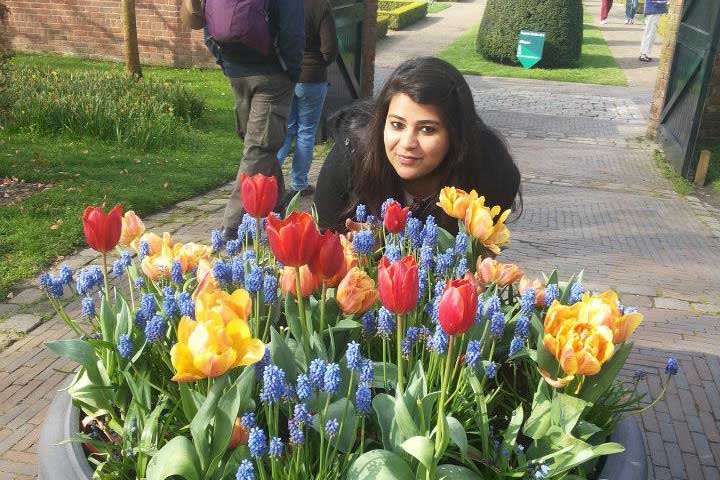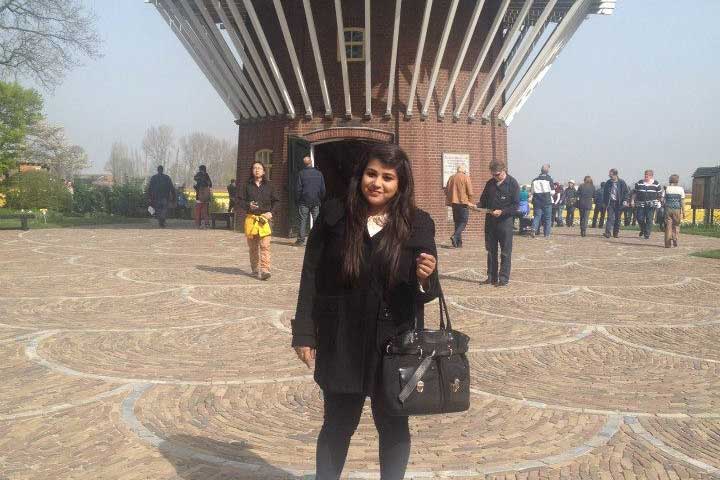Medhavi Singh talks about her journey as a Law Student of National Law University, Delhi. She had been awarded the Best Individual Oralist at the Leiden Sarin Air & Space Law Moot Court Competition. She has recently been accepted for a Masters in International Business Regulation, Transnational Litigation and Arbitration at New York University.
In this interview, she tells us about:
- The essentials of mooting every Law Student should keep in mind
- What goes into excelling an International Moot
- The importance of an LL.M from a foreign University
- The application process for an LL.M in the U.S.
How would you like to introduce yourself to our readers? Tell us a bit about your childhood, your hometown and your pre-graduate life as well. What motivated you to choose law as a career?
I am a student of Delhi Public School, RK Puram. Originally, I am from Patna City, Bihar but have been brought up in Delhi. It was in Grade 7 that I first came across abook written on the subject of law. It was “The Colour of Law” by Mark Gimenez. The protagonist of the book was so inspiring that when I finished reading the book, I immediately knew I had to become like him. Of course, I think differently now since his practice in the book was criminal, but yes, that was my first ever motivation to pursue law as a career. Having this in mind, I took up Humanities with Maths in class 11th and 12th. I knew that subjects such as History and Political Science are tested in the National Law School exams and thought that taking these subjects would definitely be advantageous, which they actually turned out to be! For example, taking up Political Science was extremely helpful in understanding the political system of India as well as the Constitution of India, which is an integral subject from the view point of the entrance examinations.
None of my family members are lawyers and I didn’t even know anyone who was a lawyer at the time I had decided to take it up. Thankfully, my family gave both my sister and me enough freedom to decide what we wanted to do with our lives, so they were pretty content with my career-goal.
How did you gravitate into mooting? When did you decide to take up mooting seriously as a law student?
At the outset, I would like to say that there is probably nothing more fun than mooting when you’re in law school. It’s hard work, for sure but the excitement it brings to a person at law school is absolutely unparalleled. I’m not sure how I ‘gravitated’ into mooting but I guess it’s something that most of the people in law school try anyway! I liked it so much after my first try that I couldn’t stop even when I was in my fifth year! For me, mooting was always a serious activity. It was fun but only as long as the results were positive, for which you needed to be serious about your work.
I got drawn towards mooting especially when my team reached the finals of the KK Luthra Moot Court Competition on International Criminal Law in 2011. I remember being extremely nervous about not making it to the next round right from the first round but thankfully, it worked out well for us. Arguing in front of distinguished judges, finding loopholes in settled law as well as arguing on and learning about contemporary issues with no settled law seemed extremely exciting!
You have been the Best individual Oralist at the prestigious Leiden Sarin Air & Space Law Moot Court Competition held in Romania in March this year. Please tell us about your overall experience there regarding the competitors, the judges and other ancillary things.
This moot was the best experience possible. I had been attempting to go for this moot since the second year of college and for some reason or the other, I couldn’t go until my last year – either I didn’t make the cut or the moot wasn’t included in the list. But anyway, I finally managed to go!
This moot was special to me because I was very fond of Aviation Law as a subject of law. It was a field of international law that was always on the ‘move’. I must commend the Leiden-Sarin Organisers on the judges that had been called for the moot. During the entire moot, not once was I asked to state the facts and the questions that were posed to my teammate and me were precise, to the point and relevant to the problem at hand. What was more exciting about this problem was that it was based on a topic which has not yet been resolved, which meant that there was scarcity of material on the topic, which in turn helped us to make innovative and new arguments, applying not only to Aviation Law but also to different facets of International Law.
How much preparation did you require for this success? Did you burn the midnight oil to excel in this moot? How much dedication and hard work was necessary for to ace Leiden Sarin?
I’m not going to make it sound easy because I don’t think that’s honestly possible. Preparing for this moot was insanely hard. NLU-Delhi has a policy that all students must remain on campus through the week, even if you are from Delhi and I was known to be the one going home all the time for some reason or the other. I can vouch that it was during the time that I was preparing for this moot that I stayed the longest on campus, that too in the December-January winters. So yes, it’ a lot of work, but I am not complaining. I actually enjoyed myself, minus the sleep deprivation!
What would you say differentiates between the best oralists and the rest? What are the top three things you consider sine qua non for being a great oralist?
I think the most important criterion for being a great oralist is to be able to read the judge and understand what they’re looking for. We all do our homework in the sense of learning pleadings, facts, authorities etc. but ultimately, it comes down to how you can satisfy the bench before you. A judge may or may not know the problem very well, so it’s extremely important to answer his/her questions in a satisfactory manner, otherwise you end up losing the rapport that you’ve built with him/her. So according to me, on the top it would be understanding what the judge is asking for – for example, either answering questions in a precise manner or a detailed manner-and delivering the same.
Secondly, I would want to emphasise on the importance of using relevant and contemporary real-life examples to back your case. It’s extremely important to let the judges know that what you’re arguing is in fact being practised at that very moment. I think it creates a huge impact on them.
Thirdly, it is undeniably important to focus on you mannerisms. When it comes to mooting, most people will have the same amount of knowledge as you do and the only edge that you’ll ever have is to be able to display that knowledge and deliver your arguments effectively and differently by enhancing your mannerisms.
For the most time that I was practicing my pleadings for the Leiden-Sarin Moot, I was concentrating on speaking slower (owing to the fact that all the judges were going to be from a foreign land) and remaining composed while answering questions. The best way to remain composed is to think of the whole procedure to be a meaningful conversation between the judges and yourself and to not let yourself get intimated by them; you probably know more than them about the problem at hand if you’ve done your research well!
What prompted you to apply for an LL.M. abroad? Does it help given the career you have chosen? Why didn’t you opt for an LL.M. from India given that now we have 1 year LL.M as well?
I experienced dispute resolution on an international scale for the first time at the Global Young Leadership Conference held in the US, where I was selected to represent India. Here, I was exposed to the tactful methods of negotiation rendered by people in addressing world issues. To further delve into the realm of international dispute resolution, I took part in Model United Nations, representing different States in various committees. I believe both these events formed the initial basis of my interest in dispute resolution on an International scale.I was drawn to International Law right from the beginning when I took part in the KK Luthra moot and ultimately by the fourth year narrowed down my liking to transnational litigation and international arbitration.
The reason why I applied to foreign universities as opposed to an Indian one is definitely the courses that were being offered by the foreign universities as opposed to the one that were being offered in India. NYU was one University that offered a course on International Business Regulation, Transnational Litigation and Arbitration. I was excited to apply for this course because it befitted my aspirations perfectly and I wasn’t getting such an option anywhere else.
You have got through to an LL.M. programme at the New York University. What do you think clicked in your favour during the selection process? How did you plan your Statement of Purpose for NYU?
I think what worked for me was the clear picture that I had in my head with respect to what subjects I wanted to study as well as what benefit I would derive out of studying those subjects and how I would be able to apply the knowledge acquired by studying those subjects to fulfill my career-goals. My SoP had clear indications of what inspired me to choose this field, how I have already started worked in this field by means of internships, research papers etc. and how studying it would help me achieve my future plans.
I know for a lot of people, LL.Ms are just ‘further studies’ but I think it’s much beyond that. I know it’s not a pre-requisite for any activity that you would want to undertake after law school but I feel that sometimes, it is quintessential to get expertise in niche areas, especially when you want to specialise in the same.
Building up on your profile from the view point of an LL.M is essentially maintaining excellent grades through law school. The competition can get to you sometimes but it’s not impossible. Other activities could include mooting, debating, writing papers and even being members of relevant groups at your law school.
For an LL.M you needed to have a student VISA. What are the requirements for a successful VISA application? As a lot depends on the VISA application did you prepare for the interview?
The Visa application is a long drawn one month procedure. I can answer this question for the US Universities since that’s the procedure I am privy to. You need to first apply for your I-20, for which your University will provide you with details. The US University would then send you a hard copy of your I-20 which you must keep extremely carefully. After having done that, you must pay a fees online called the SEVIS fees and must keep multiple receipts of the same. Then you have to fill out the DS-160 form and make the visa application fees in cash to the specified banks (Axis or PNB). At the bank, they would generate a number for you which you have to use to schedule an appointment with the US Embassy. Once you have received your I-20 and paid the SEVIS fees, the visa application becomes easy and there’s not much you can do. My interview was a one line question where I was asked why I was going to NYU and which subjects I was specialising in. I was asked to pick my passport up with the visa the very next day! So no, not much preparation is required for the interview. But it’s always safe to carry all the documents with you just in case you’re asked for them.
What would be your message to law students who look forward to an illustrious law school life?
I would say it’s about maintaining excellent grades in law school and having a clear picture about what you want to study and why. It’s important to ask yourself these questions to be able to figure out whether you really want it or not. Apart from this, I would recommend all of you to have at least three teachers in mind, who have credibility and are somewhat renowned in their respective fields, who would be willing to help you out with your letters of recommendation. These letters have a huge influence on your application and must not be taken lightly! The whole application procedure seems daunting and you could feel lazy at times but trust me, in the end, it’s definitely worth it!

























